YETI Crossroads 22L Backpack Review
The YETI Crossroads 22L Backpack is a hardy daypack that goes from city to trail with ease, though the Flip-Top Vault pocket took some getting used to.
Our Verdict
Save time. Get access to brief summaries of our reviews so you can browse and make decisions more efficiently.
Pros
- Main compartment is roomy and packs out well
- Plenty of attachment points on the outside
- Material is easy to clean and can handle unpredictable weather
Cons
- Flip-Top Vault pocket is heavy and bulky when full
- Hard to quickly access main compartment
- Difficult to use quick-access side pockets with compression straps on
Technical Details
-
Capacity
22l
-
Weight (lb)
3 lb (1.4 kg)
-
Dimensions
18.13 in x 11.5 in x 8.5 in (46.1 x 29.2 x 21.6 cm)
-
Notable Materials
Nylon, YKK Zippers, Duraflex Hardware
-
Manufacturing Country
Philippines
-
Laptop Compartment Size
15"
-
Warranty Information
Full Review
As the smallest of the three backpacks in YETI’s Crossroads line, this 22L backpack is designed to be used on the daily. Whether you’re commuting to work across town or heading to the park for an afternoon picnic with plenty of wine and cheese (we highly recommend this particular activity), you’ve got plenty of internal storage to get you through a day or two of activities. That being said, the straps can get pretty uncomfortable if you’re carrying around too much gear for too long, and the Flip-Top Vault pocket takes some getting used to.
This backpack is great if you have a place to unload gear as-needed (a friend’s house, a hotel room, etc.), but some of its features can make it inconvenient to get through the day with more stuff on hand.
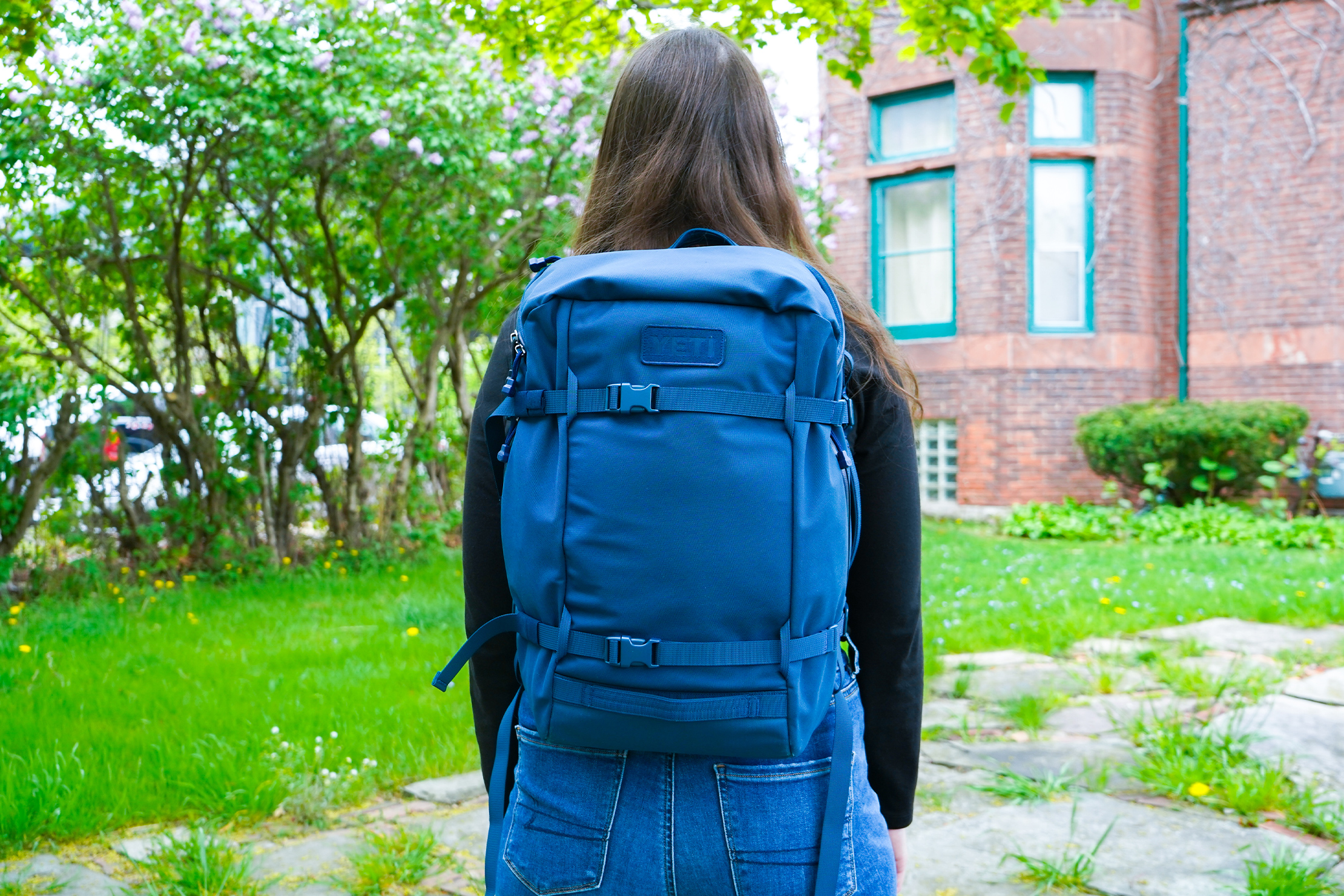
If you’re wondering where you recognize the Crossroads name—other than the 2002 hit movie starring Britney Spears and Zoe Saldana, of course—you may be thinking of the YETI Crossroads Backpack 23. Though it’s similar in size to this newest iteration, it has a few key differences, including more comfortable straps, plenty of internal organization, and a full clamshell opening. These changes make it hard to compare the two, though they both function well as a daypack depending on your needs.
With all of this in mind, let’s take a closer look at how the Crossroads 22L Backpack held up during our two weeks of testing.
Materials & Aesthetic
The durability of this backpack is what grabbed our attention first and foremost, and it ended up being the main highlight of the pack. YETI is known for making super hardy coolers, so it was only natural that they took this technology and put it in a backpack designed to go everywhere with you.
YETI president and CEO Matt Reintjes said they designed the Crossroads line for those who were “seeking durable products that met their needs both in active pursuits and in their daily lives.” With a sleek-yet-sporty design that satisfied 74% of our Instagram followers, this is the kind of backpack you grab when you want to spend the day adventuring without worrying about whether the bag can handle inclement weather or rough terrain.
It’s made with weather and stain-resistant Tuffskin™ Nylon—a durable material you may recognize from some of their coolers—so water easily beads off the material on contact, and any grossness comes off with a rag or paper towel. We could even get some more mysterious stains off with a few swipes of the finger; no water needed. On top of that, the GroundControl PU base is stiff, hardy, and made us confident that the backpack would come away from practically any situation damage-free.
The YKK zippers and Duraflex buckles are about as reliable as it gets, adding peace of mind to your travels.
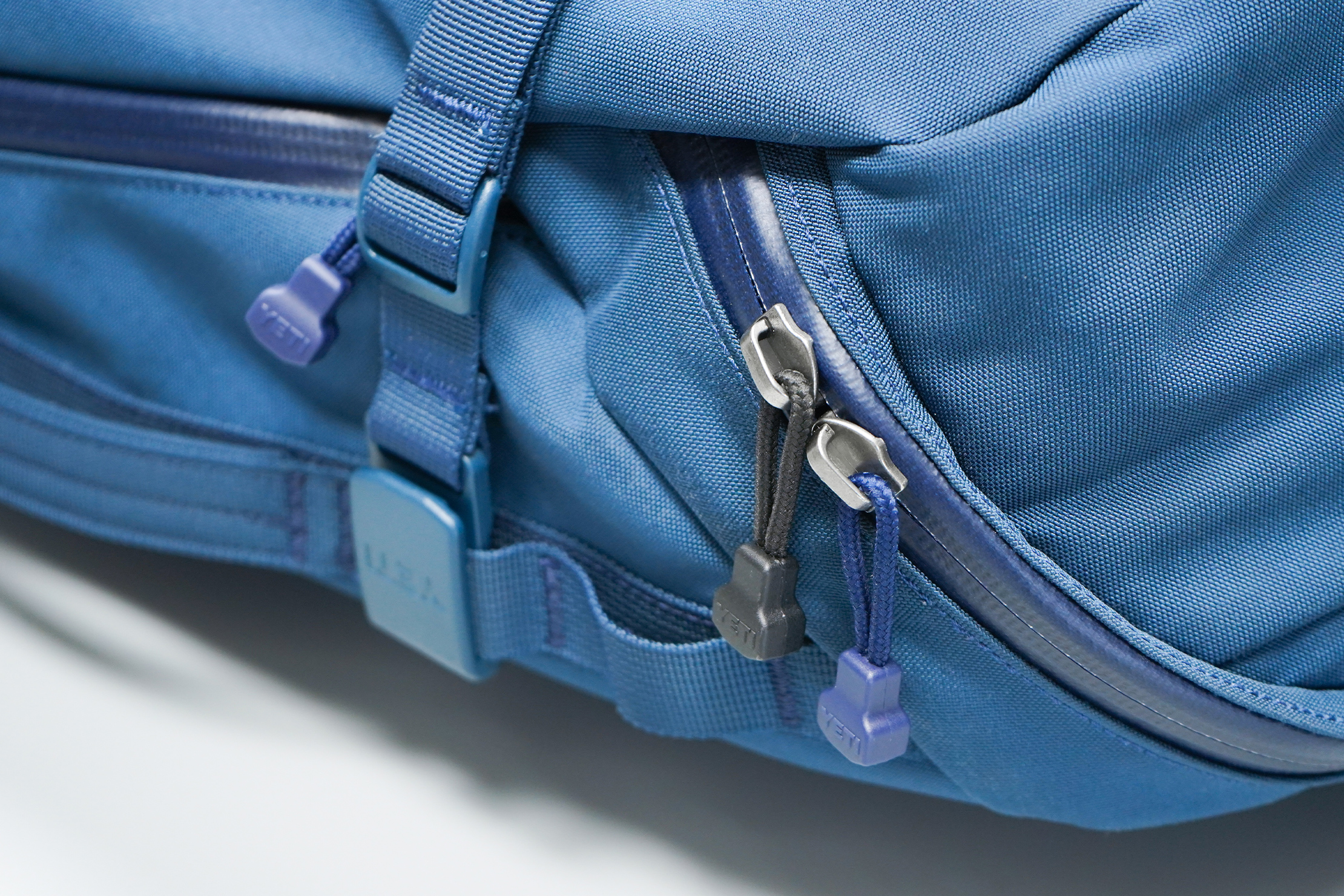
We weren’t blown away by the amount of colorway options, but the subtle branding was a nice touch and added to the sleek, stylish look. There’s a patch on the front and subtle indenting on the back panel (which doubles as a luggage pass-through), and both are noticeable without being gaudy.
Whether it’s packed to the brim or still has room for more cheese (seriously, take this thing on a picnic), the bag holds its rounded, structured shape no matter the size or shape of the items inside. But beware: if it’s not bottom-heavy enough, it’ll fall over the second you set it down.
External Components
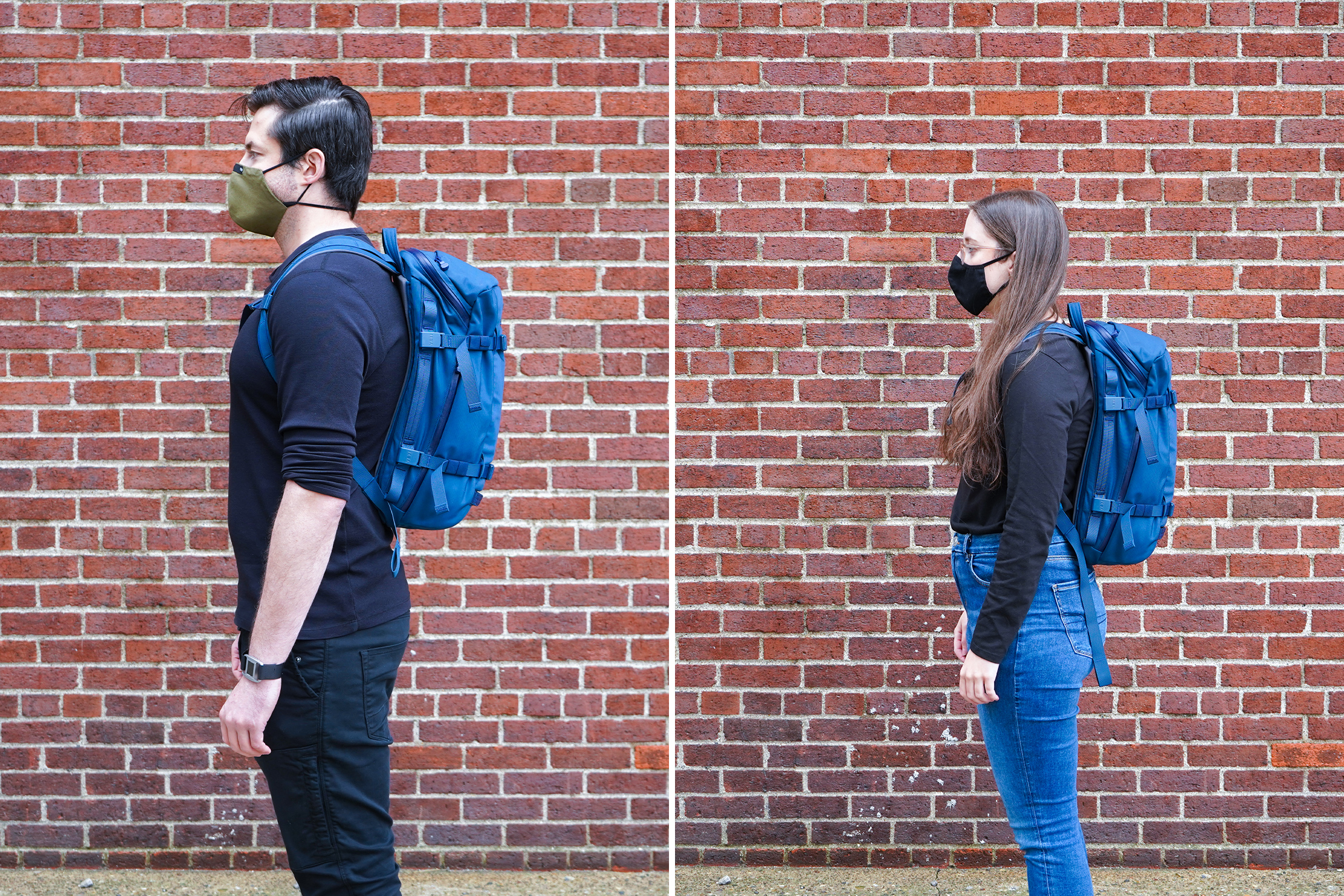
The straps are lightly foamy, but we ended up disappointed in the comfort levels once we had the pack on for an extended period of time. The material is stiff along the seams of the straps, which ended up being a little too rough on some of the narrow-shouldered folk here at Pack Hacker. You can always use the sternum strap to alleviate some of the weight, and there are plenty of attachment points to adjust it to any stature, but those same narrow-shouldered folk found that it only shifted the pain from the shoulders to the neck.
It also lacks breathability, so this isn’t the kind of backpack you want to be stuck with for miles of walking on end if it’s packed to the brim. It may benefit from some load lifters or a hip belt, though a daypack this small shouldn’t need all that extra help just to be comfortable.
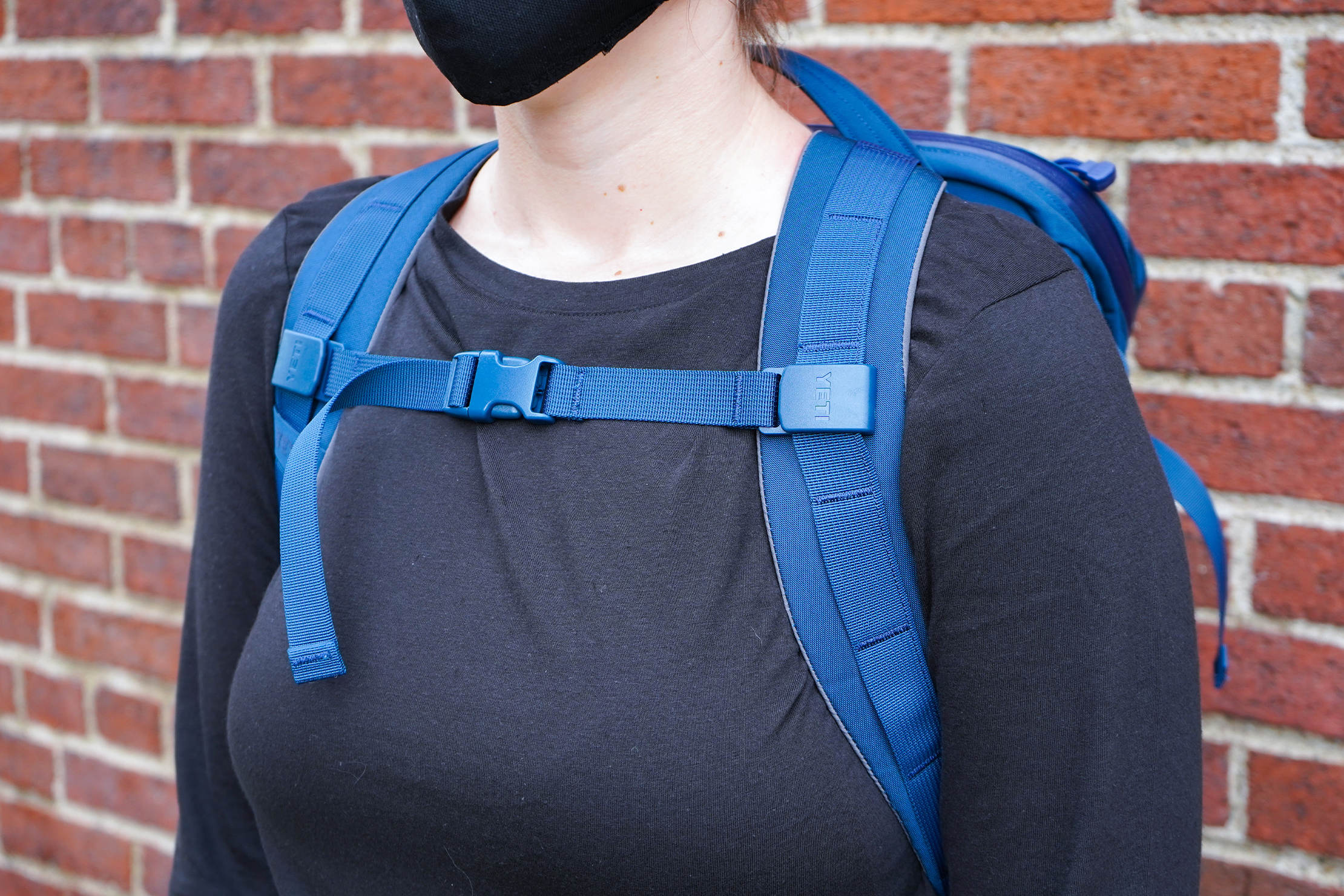
There are four handles on the outside of the bag: one up top for quick grabs, one just above the base for added support with heavy loads, and one on either side to help you keep the bag stable as you access the zippered “SideHustle” side pockets.
Though all four handles proved to be useful, we did find that they easily retain water. The inside of the pack will stay dry if you get caught in some rain thanks to the water-resistant exterior and YKK zippers, but you’ll be stuck grabbing at damp handles for a few hours as they slowly dry out. So, if you’re using those handles to get better access to the bag, be prepared to get your hands a little clammy.
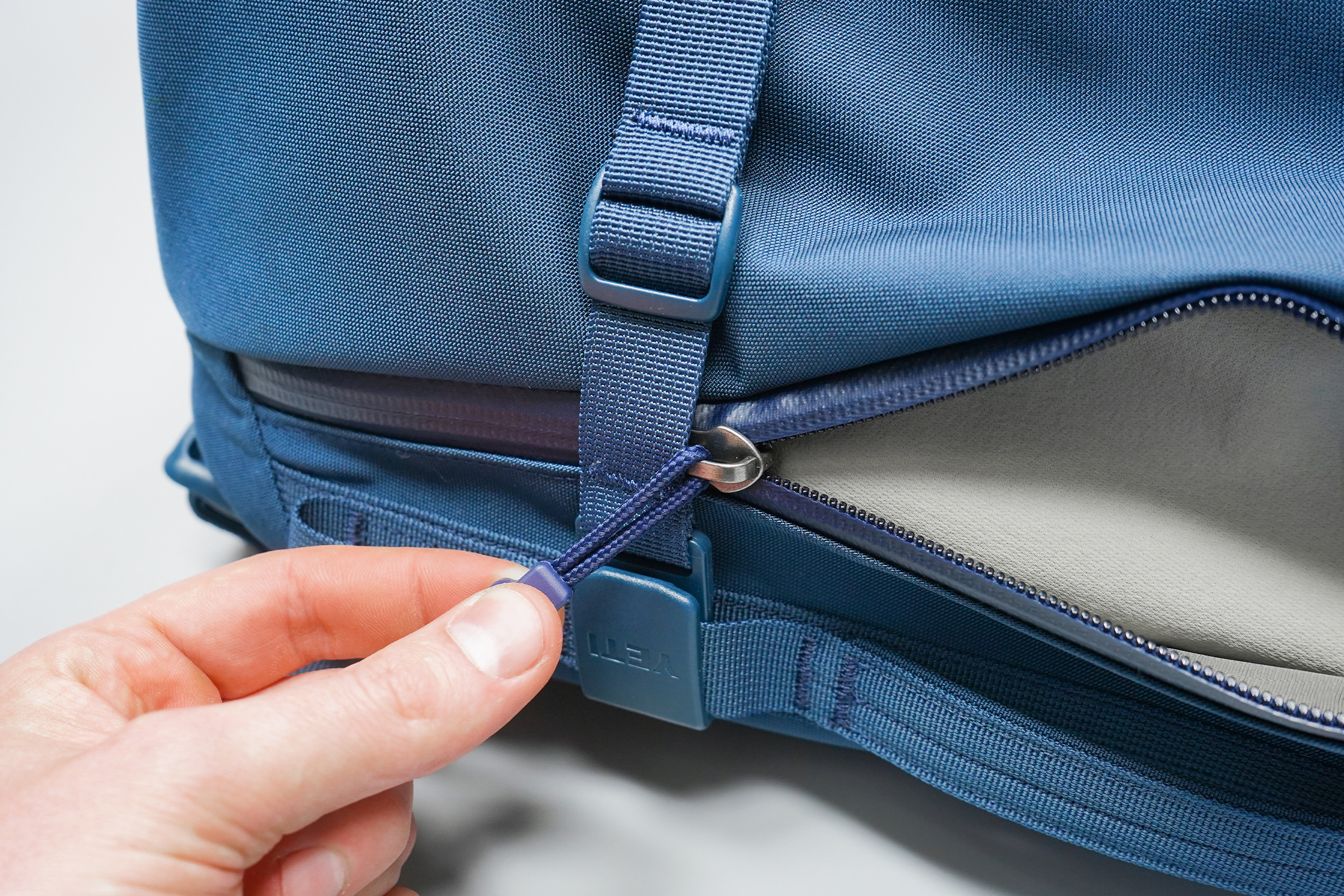
The compression straps help lock things down if you do end up making the most out of all 22 available liters, but we found that they got in the way more than anything. They cover up a portion of the side zippers at the top and bottom and make accessing either pocket more frustrating than it needs to be. They’re also pretty tough to adjust once they’re on, so we found ourselves not wanting to bother fussing with them at all.
What makes this pack unique from the others in the Crossroads line is its horseshoe closure, which leads us into our love-hate relationship with how you access the main compartment.
Inside The Pack
On the outside of the pack, there’s a fairly large zippered pocket that holds items you want quick access to, like your wallet, keys, identification, chapstick…you get the idea. The zipper itself is hidden but not too hard to get to; however, if you’re opening it from the outside in poor lighting, it can be hard to see what’s inside.
If you’re fishing around in there for too long and get frustrated (we definitely did more than once), you can open the horseshoe top, flip that entire flap over on itself, and boom! There’s the Flip-Top Vault pocket with yet another access zipper. This zip is much longer and opens much wider, giving you a better look at whatever you’re stashing inside.
YETI Crossroads 22L Backpack | Opening the Flip-Top Vault pocket is a process that takes some getting used to.
The most significant disadvantage is that in order to get a better look inside the pocket, you have to open the Flip-Top every single time, which kind of defeats the purpose of having a quick-grab pocket in the first place. The second biggest disadvantage is that if you forget to zip up one side before flipping to the other, you’ll end up with a bunch of your small items spilling out either onto the ground or into the main compartment. Trust us, that’s a giant headache.
We also found that the pocket got heavy pretty quickly, so if you like to keep a lot of stuff on hand, then the bag will lose quite a bit of stability, and it’ll be harder to find what you’re looking for on the fly. On the plus side, we were able to stuff the main compartment pretty full and still get the lid closed, so you have some room to work with.
There’s one other internal zippered pocket, but it’s hard to access unless you completely flip the top open or wiggle your hands underneath the Flip-Top Vault’s pouch. It’s about 6 inches deep, so we used this for stuff we didn’t need very often, like dental floss, eye drops, or a pen. We were glad to have it, but we do wish it was easier to access without messing with the Flip-Top.
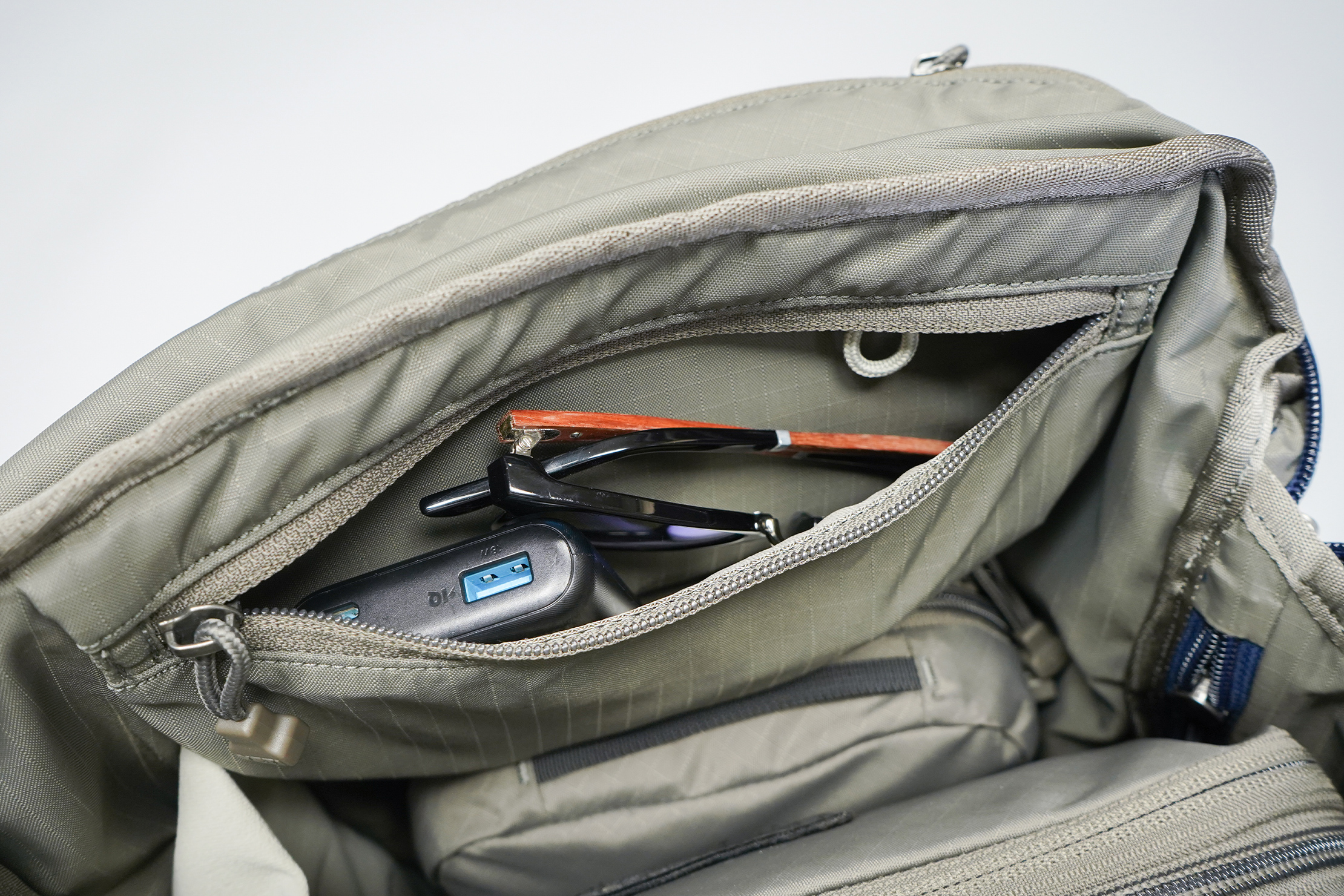
One last thing we want to talk about is the zippered side pockets we mentioned earlier. There’s one on each side, and they both serve different purposes. If you find yourself having a hard time keeping them straight like we did during our testing, you can attach a keychain or piece of paracord as a simple and easy reminder.
If you’ve got the pack on your back, the right side zipper gives you quick access to the water bottle pocket, while the left gives you access to the full main compartment. Main compartment access is always nice to have for quick stashing or grabbing, and we found that it came in handy if we wanted to reduce some of the weight in the Flip-Top Vault pocket without losing those items in the deep, dark depths of the bag.
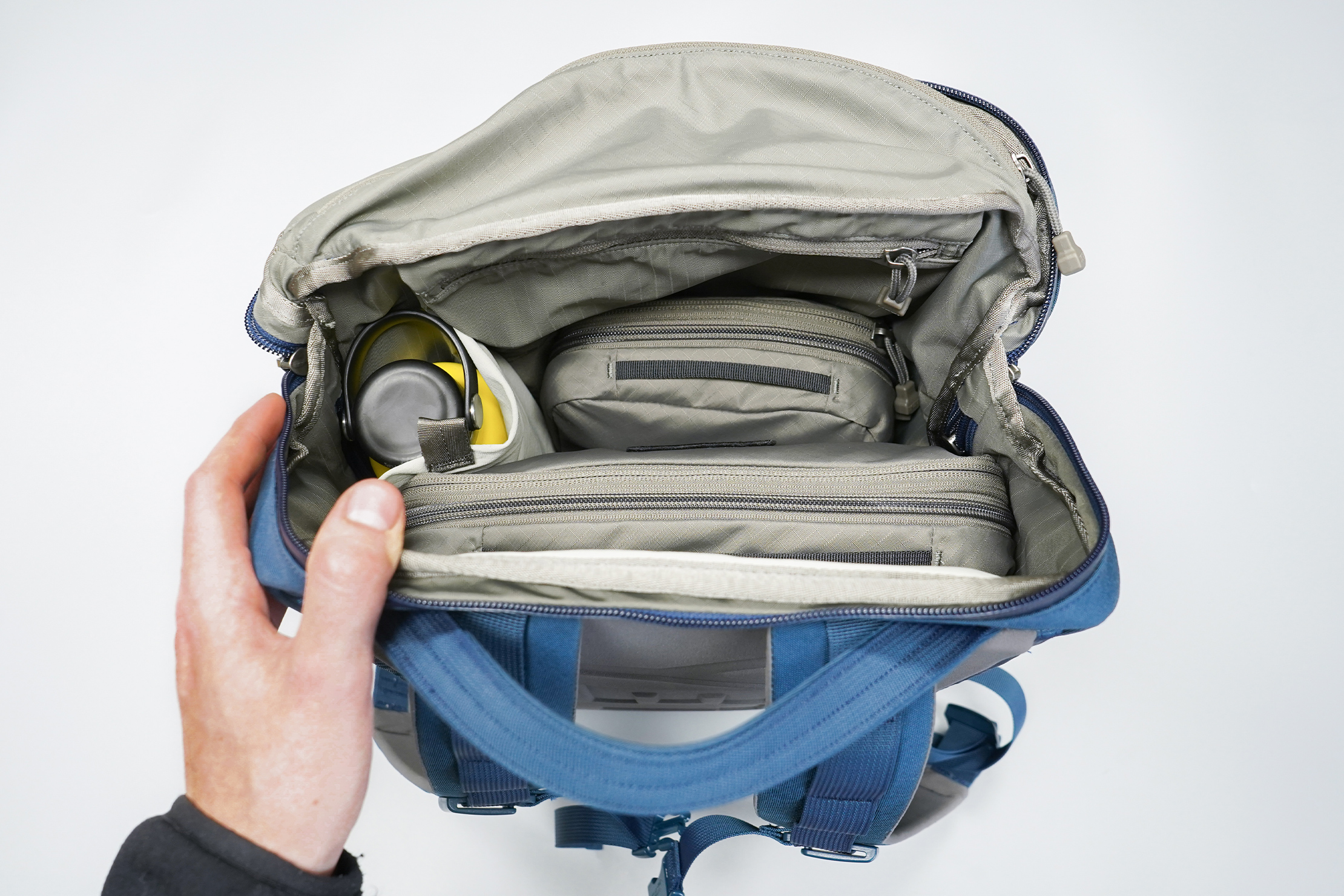
The water bottle pocket is super spacious—we were able to fit a 40oz bottle no problem—but it’s hard to get any bottle out of the side zippers if you’ve got the compression straps on. The pocket material is stretchy and waterproof, and it opens into the rest of the pack for easier top-loading. Spilled liquid can make its way into the main compartment since there’s no enclosure to stop it, so be careful if you flip the bag sideways to get your bottle via the quick-grab pocket without knowing there’s a spill.
Along the back is the laptop sleeve, which has a suspended design that protects your tech if you drop the bag or set it down a little too aggressively. The main sleeve comfortably fits up to 15” laptops, while the smaller sleeve is great for a tablet, notebook, or wireless keyboards. Both pockets have some stretch to them, so you can easily fit awkward or bulky items if necessary.
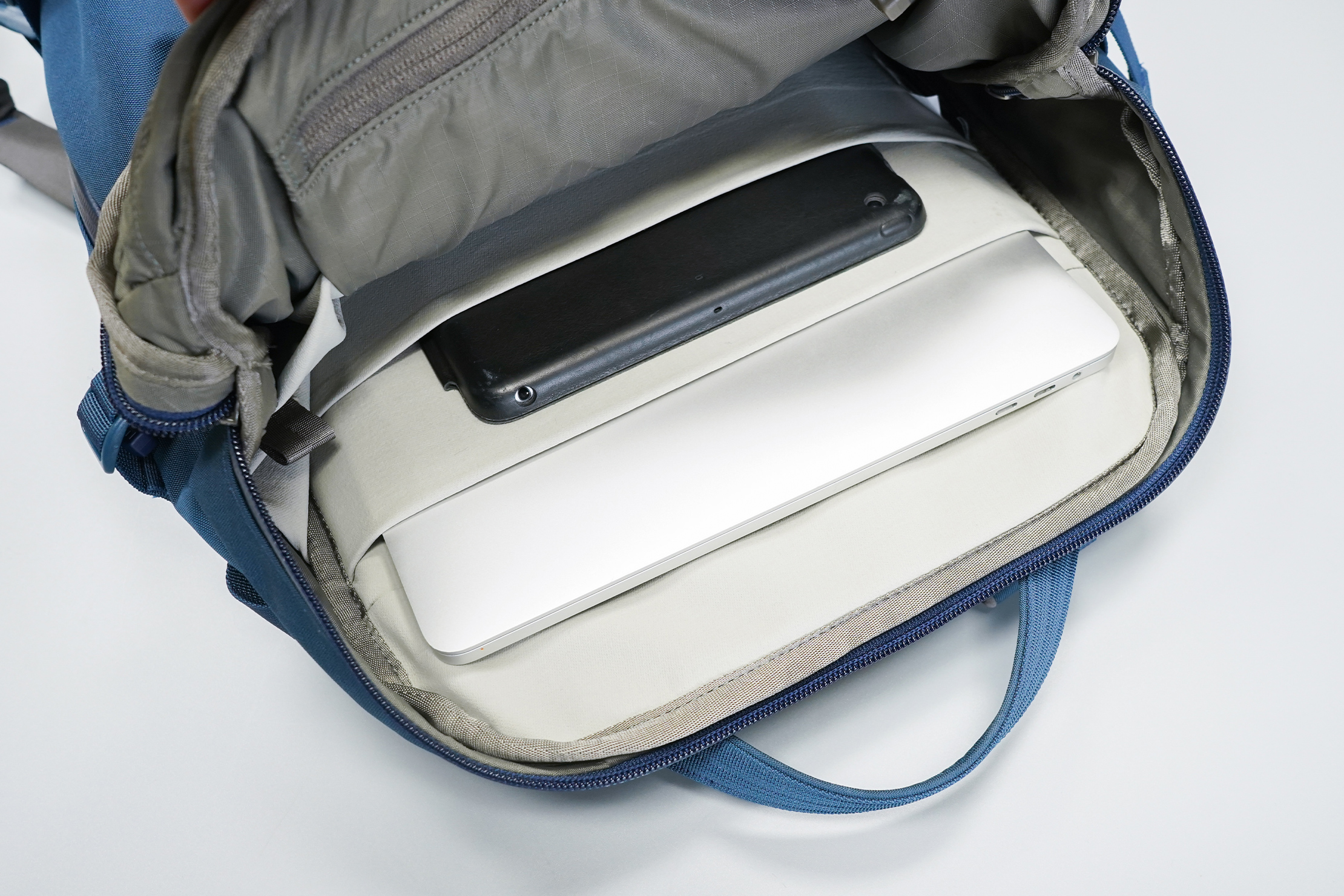
This is pretty much where the internal storage ends. The main compartment is free to pack as you please, which worked more for us than against us. Sure, it would be nice to have another pocket or two, but we would have liked to see that on the outside rather than the inside.
If you’re looking for more organization, the YETI Crossroads Packing Cubes are designed to fit within the Crossroads line. They recommend the medium and small for this 22L backpack, but we could get the large in there as well if it wasn’t too full.
Because this is a daypack designed for a variety of uses rather than a handful of specific activities, YETI worked hard to create a versatile design that’s still functional. Unfortunately, this fell a bit flat, as most of the features seemed to clash with one another, creating an often clunky and uncomfortable bag that didn’t match the reliability of its durable exterior. In terms of overall function and construction, we prefer the Crossroads Backpack 23. That being said, this newer model is a great option for outdoorsy types who want more carrying power and stability than an ultralight backpack can provide.
Usage Timeline
Condition: Excellent
- Has a tough-looking and feeling outer fabric
- Wide-spanning straps keep the bag really tight
- Pouch-style interior pocket has good volume
Condition: Excellent
- Material is in great shape and easy to clean
- No issues with any zippers sticking or breaking
- No loose stitching inside the pack or out
- Flip top is awkward to use at the start but gets more comfortable over time
- Compression straps are pretty useless
- Straps are uncomfortable to wear long term


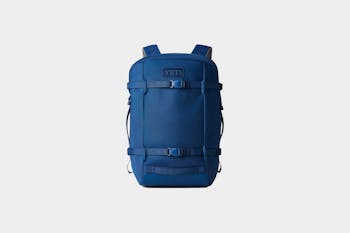






Get your questions about the YETI Crossroads 22L Backpack answered from our team and the Pro Community right here on the page. Plus, join discussions with other members about gear, guides, and more.
Join Pack Hacker Pro or, Sign In